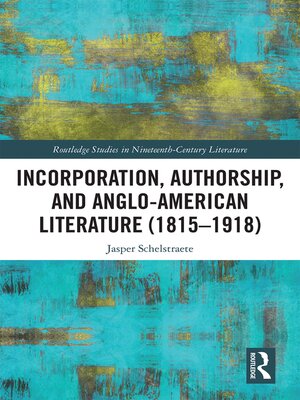Incorporation, Authorship, and Anglo-American Literature (1815–1918)
ebook ∣ Routledge Studies in Nineteenth Century Literature
By Jasper Schelstraete

Sign up to save your library
With an OverDrive account, you can save your favorite libraries for at-a-glance information about availability. Find out more about OverDrive accounts.
Find this title in Libby, the library reading app by OverDrive.



Search for a digital library with this title
Title found at these libraries:
| Library Name | Distance |
|---|---|
| Loading... |
Incorporation, Authorship, and Anglo-American Literature (1815–1918) is concerned with the new ways in which nineteenth-century authors came to imagine nationhood in response to the emergent global market. It investigates how authors negotiated a largely unregulated global economic space, both imaginatively—in their representations of it—and pragmatically, through author-publisher agreements to circumvent the lack of transnational copyright or through market-driven self-censorship for different audiences. Until now, scholarship has struggled to find a single dynamic from which to consider the Anglo-American transatlantic cultural field, and transnational fields more generally. This volume offers that single dynamic through an innovative and interdisciplinary approach that brings together the research areas of literary and transnational studies with economic history. It shows how the positional national identities constructed by nineteenth-century texts were informed by economic self-interest in the emergent global marketplace. Through a series of case studies the book analyses how contemporary economic innovations determined nineteenth-century concepts of national and cultural self-identification. Presented within four main body chapters, each considers two case studies of nineteenth-century authors that are in productive contrast, including pairings between Herman Melville and Washington Irving, E.D.E.N. Southworth and Anthony Trollope, Charles Dickens and Harriet Beecher Stowe, and finally Thomas Hardy and Joseph Conrad.







